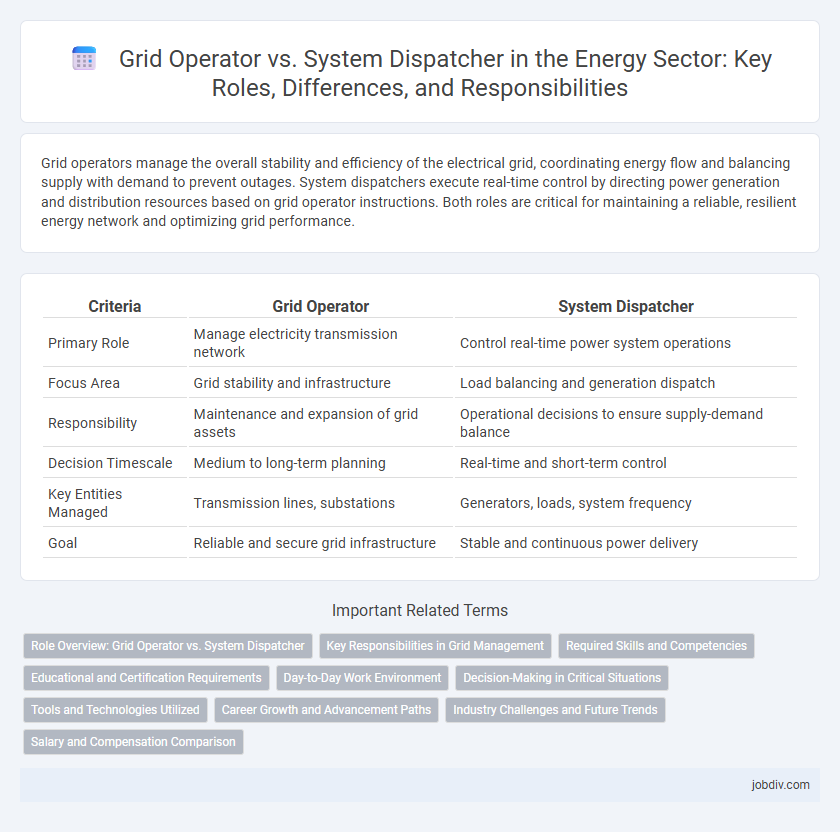Grid operators manage the overall stability and efficiency of the electrical grid, coordinating energy flow and balancing supply with demand to prevent outages. System dispatchers execute real-time control by directing power generation and distribution resources based on grid operator instructions. Both roles are critical for maintaining a reliable, resilient energy network and optimizing grid performance.
Table of Comparison
| Criteria | Grid Operator | System Dispatcher |
|---|---|---|
| Primary Role | Manage electricity transmission network | Control real-time power system operations |
| Focus Area | Grid stability and infrastructure | Load balancing and generation dispatch |
| Responsibility | Maintenance and expansion of grid assets | Operational decisions to ensure supply-demand balance |
| Decision Timescale | Medium to long-term planning | Real-time and short-term control |
| Key Entities Managed | Transmission lines, substations | Generators, loads, system frequency |
| Goal | Reliable and secure grid infrastructure | Stable and continuous power delivery |
Role Overview: Grid Operator vs. System Dispatcher
Grid operators manage the overall electricity grid infrastructure, ensuring reliability and coordination of power generation and distribution across regions. System dispatchers handle real-time control, balancing supply and demand while responding swiftly to outages or fluctuations to maintain stable grid operations. Both roles are essential for optimizing grid performance and preventing blackouts.
Key Responsibilities in Grid Management
Grid Operators oversee the overall coordination and management of electricity distribution, ensuring grid stability and optimal power flow across regions. System Dispatchers focus on real-time control, managing load balancing, and responding promptly to system disturbances to prevent outages. Both roles are essential for maintaining reliability and efficiency in energy transmission and distribution networks.
Required Skills and Competencies
Grid Operators require strong technical knowledge of electrical networks, real-time monitoring abilities, and proficiency in grid management software to ensure stable power distribution. System Dispatchers must excel in decision-making under pressure, coordination skills across multiple control centers, and comprehensive understanding of system reliability and emergency protocols. Both roles demand analytical skills, situational awareness, and effective communication to maintain grid stability and respond swiftly to outages or system disturbances.
Educational and Certification Requirements
Grid operators typically require a bachelor's degree in electrical engineering or energy management, along with certifications such as NERC System Operator Certification to ensure compliance with industry standards and grid reliability. System dispatchers often pursue specialized training programs and obtain certifications like the Certified System Dispatcher (CSD) to develop operational expertise in real-time grid control and emergency response. Both roles prioritize continuous education to maintain up-to-date knowledge of evolving energy regulations and advanced grid technologies.
Day-to-Day Work Environment
Grid Operators monitor and control the electrical grid to ensure stable power distribution, managing real-time load fluctuations and coordinating with power plants and substations. System Dispatchers focus on executing operational plans by directing the flow of electricity across the network, resolving contingencies, and responding to emergencies. Both roles require continuous communication, rapid decision-making, and adherence to safety protocols within a high-stakes, dynamic environment.
Decision-Making in Critical Situations
Grid Operators manage real-time electricity flow to maintain grid stability, using advanced monitoring systems and predictive analytics to respond swiftly to demand fluctuations or faults. System Dispatchers make operational decisions during emergencies, coordinating power generation and load balancing to prevent outages and ensure continuous supply. Their decision-making relies on situational awareness, rapid data processing, and adherence to regulatory protocols, crucial for maintaining grid resilience under critical conditions.
Tools and Technologies Utilized
Grid operators deploy advanced SCADA systems, real-time data analytics, and predictive algorithms to monitor and control electricity flow across the transmission network. System dispatchers utilize energy management systems (EMS), automated generation control (AGC), and demand response technologies to balance load and generation dynamically. Both roles leverage GIS mapping and IoT sensors to improve grid reliability and operational efficiency.
Career Growth and Advancement Paths
Grid operators and system dispatchers play crucial roles in energy management, with distinct career growth trajectories. Grid operators often advance into senior operational management or regulatory roles, leveraging expertise in real-time grid stability and compliance. System dispatchers tend to progress toward higher-level control center management or specialized technical positions, focusing on system reliability and emergency response coordination.
Industry Challenges and Future Trends
Grid operators manage real-time electricity transmission and ensure grid stability by balancing supply and demand across the network, facing challenges such as integrating renewable energy sources and handling grid congestion. System dispatchers focus on short-term operational decisions, coordinating power generation and load dispatch to prevent outages and optimize energy flow, under increasing pressure from decentralized generation and rapid demand fluctuations. Future trends emphasize advanced AI-based predictive analytics, enhanced cybersecurity measures, and increased automation to improve responsiveness and resilience in energy management systems.
Salary and Compensation Comparison
Grid operators typically earn an average annual salary ranging from $60,000 to $90,000, depending on experience and geographic location, while system dispatchers often have a salary range of $50,000 to $80,000. Compensation packages for grid operators may include performance bonuses and overtime pay due to the critical nature of managing electric grid stability, whereas system dispatchers might receive hazard pay or shift differentials for irregular work hours. Variations in salary between these roles often reflect differences in responsibility scope, required technical expertise, and regulatory compliance duties within the energy sector.
Grid Operator vs System Dispatcher Infographic

 jobdiv.com
jobdiv.com